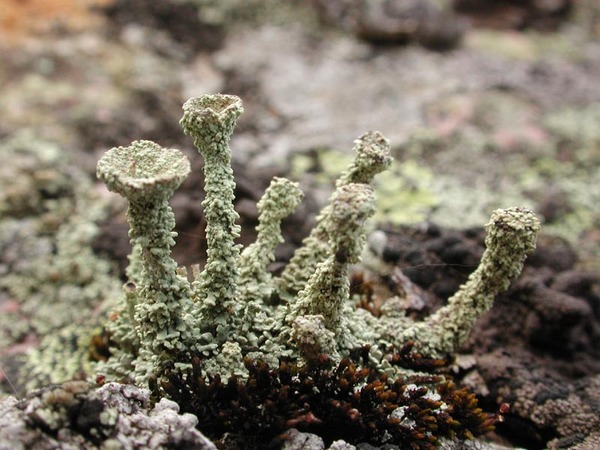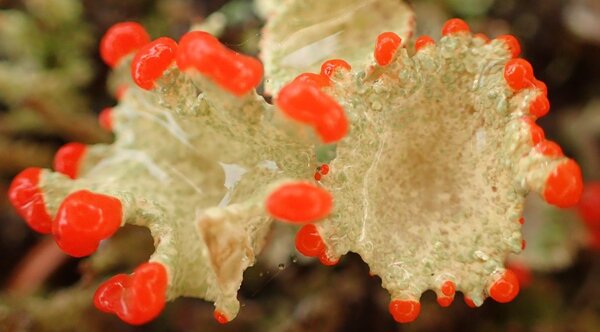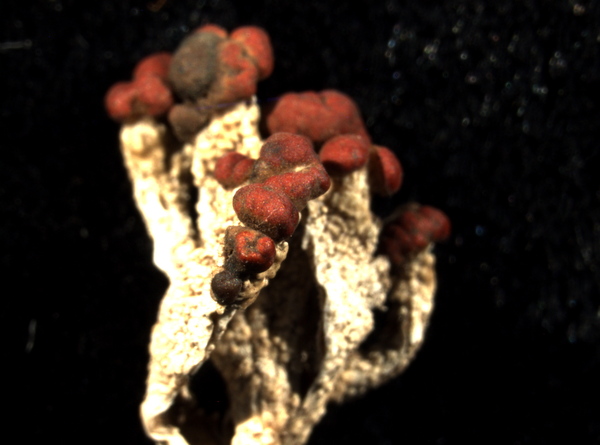Cladonia straminea (Sommerf.) Flörke
Clad. Comm.: 87, 1827. Basionym: Cenomyce straminea Sommerf. - Suppl. Fl. Lapp.): 128, 1826
Synonyms: Cladonia metacorallifera Asahina
Description: Primary thallus squamulose, persistent, the squamules up 4 mm wide, flattened, moderately divided into small, rounded lobes, dark yellowish green above, white beneath. Podetia goblet-shaped, dark yellowish green, hollow inside, with narrow cups, 4.5-7.5 mm tall, 2-4 mm wide, 1.5-2 mm thick at base, corticate, covered with numerous squamules and microsquamules, sometimes mixed with granules; basal areas and margins of cups often decorticate, with a visible blackened stereome. Apothecia scarlet red, mostly on the margins of cups. Asci 8-spored, clavate, thickened at apex, with a K/I+ blue tholus and a K/I+ strongly blue outer gelatinous sheath, Cladonia-type. Ascospores 1-celled, hyaline, ellipsoid. Pycnidia red, most frequent along the margins of cups, with a red slime. Conidia hyaline, curved. Photobiont chlorococcoid. Spot tests: chemotype a): K-, C-, KC+ pale yellow, P-, UV+ white; chemotype b): K+ yellow, C-, KC+ pale yellow, P+ yellow, UV–. Chemistry: chemotype a): usnic, didymic and squamatic acids; chemotype b): usnic, didymic and thamnolic acids. Rhodocladonic acid in apothecia of both chemotypes.
Growth form: Fruticose
Substrata: soil, terricolous mosses, and plant debris
Photobiont: green algae other than Trentepohlia
Reproductive strategy: mainly sexual
Most common in areas with a humid-warm climate (e.g. most of Tyrrenian Italy)
Commonnes-rarity: (info)
Alpine belt: extremely rare
Subalpine belt: extremely rare
Montane belt: extremely rare
Dry submediterranean belt: absent
Humid submediterranean belt: absent
Padanian area: absent
pH of the substrata:
1 2 3 4 5
Solar irradiation:
1 2 3 4 5
Aridity:
1 2 3 4 5
Eutrophication:
1 2 3 4 5
Poleotolerance:
0 1 2 3
Altitudinal distribution:
1 2 3 4 5 6
Rarity
absent
extremely rare
very rare
rare
rather rare
rather common
common
very common
extremely common
Loading data...
Occurrence data
Predictive map
Growth form: Fruticose
Substrata: soil, terricolous mosses, and plant debris
Photobiont: green algae other than Trentepohlia
Reproductive strategy: mainly sexual
Most common in areas with a humid-warm climate (e.g. most of Tyrrenian Italy)
Commonnes-rarity: (info)
Alpine belt: extremely rare
Subalpine belt: extremely rare
Montane belt: extremely rare
Dry submediterranean belt: absent
Humid submediterranean belt: absent
Padanian area: absent
pH of the substrata:
| 1 | 2 | 3 | 4 | 5 |
Solar irradiation:
| 1 | 2 | 3 | 4 | 5 |
Aridity:
| 1 | 2 | 3 | 4 | 5 |
Eutrophication:
| 1 | 2 | 3 | 4 | 5 |
Poleotolerance:
| 0 | 1 | 2 | 3 |
Altitudinal distribution:
| 1 | 2 | 3 | 4 | 5 | 6 |
Rarity
absent
extremely rare
very rare
rare
rather rare
rather common
common
very common
extremely common
Loading data...
Occurrence data
Predictive map









